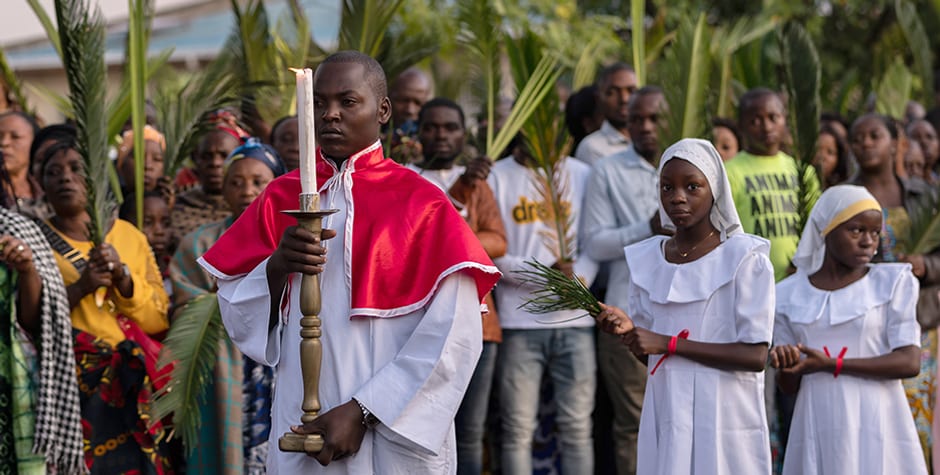She Sang Praises to God as They Stabbed and Beat Her to Death: ACLJ Demands Justice for Persecuted Christians in Congo
Listen tothis article
Déborah, a young Christian woman and member of a local church, was kidnapped by the ISIS-affiliated group Alliance Democratic Forces (ADF) in the Democratic Republic of the Congo (DRC). The ISIS militants demanded that she renounce her faith in Jesus Christ. When she refused, they said: “Then you will suffer before we kill you.” She reportedly sang praises to God as they raped, stabbed, and mutilated her, leaving her for dead. Villagers found her alive and brought her to a clinic, where she shared her story before dying. The clinic that cared for her was later destroyed by ISIS. We see this type of brutality every day in the Congo.
Ahead of the 59th session of the United Nations Human Rights Council (HRC), the ACLJ – through our international affiliate, the European Centre for Law and Justice (ECLJ) – submitted a legal filing to the U.N. HRC addressing the plight of Christians in the Congo. This submission was informed by firsthand evidence from our trusted local partner, Africa New Day, an NGO operating in Goma.
The violence intensified earlier this year in January when M23 rebels backed by Rwanda launched a deadly offensive in eastern DRC, killing 7,000 and displacing 500,000. This violence is rooted in a decades-old conflict dating back to the Rwandan genocide in 1994 and has been worsened by disasters and disease. The crisis has prompted a $2.54 billion U.N. Humanitarian Response Plan to aid 11 million vulnerable Congolese.
The turmoil in eastern DRC has created a breeding ground for Islamist terror, with ISIS affiliates intensifying their brutal campaign of abductions and massacres targeting Christians. Trapped in this crisis, Christian communities face violence from both jihadist militants and the ongoing conflict between government forces and M23 rebels.
The primary challenge in snapping the eastern region of the DRC out of its current cycle of violence and poverty is that, despite focused international attention on the violence, including from the late Pope Francis and the Archbishop of Bukavu, many still dispute the reality on the ground – considering it to be misinformation.
Detractors – particularly within circles of the European Parliament and Commission in Brussels – wrongly assume that faith-targeted persecution in the DRC is implausible simply because the nation is over 80% Christian. They dismiss the ADF as merely an opportunistic militant group, claiming its violence is random and not rooted in religious hostility, despite mounting evidence to the contrary.
The Congolese delegation, guided by the ECLJ during their visit to Brussels (May 13–16), expressed dismay at claims downplaying the targeted persecution of Christians. Camille and Esther Ntoto, founders of Africa New Day and eyewitnesses to the atrocities, emphasized that dismissing this reality not only distorts the truth but adds to the pain of victims and their families.
There are so many heartbreaking stories like Déborah’s. In February 2025, over 70 Christians – mostly women, children, and the elderly – were beheaded in a church in Kasanga after being abducted by ISIS militants. This atrocity followed a June 2024 massacre where 150 Christians were killed. Survivors describe forced religious conversions, and the late Pope Francis called the victims “martyrs.” In ADF-controlled areas, Christian names alone can be a death sentence.
The time has come for real action to be taken.
We are demanding justice, accountability, and urgent protection for Christian communities. We have formally appealed to key international institutions, urging them to do the following:
- The DRC government must prosecute those responsible for these massacres and increase protection for Christian communities.
- The ADF threat must be neutralized, especially concerning their religiously motivated attacks.
- Rwanda must be pressured to halt support for M23, which exacerbates the region’s instability.
- M23-controlled areas must be returned to DRC sovereignty immediately.
- Aid efforts must prioritize partnerships with community-based organizations rooted in the local context.
The world must not stay silent in the face of such brutality. Now is the time to call for justice, ensure protection for the persecuted, and defend the right to religious freedom in the DRC and beyond. But we can’t do this alone.
Sign our petition: Protect Christians From Massacre in the Congo. Then tell your church leaders to engage, speak out against the persecution, and find ways to help our brothers and sisters in Christ.
